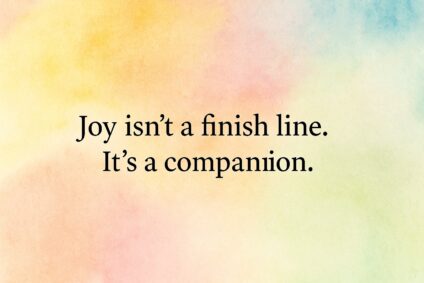Joy in the Margins
“Joy doesn’t cancel out the heavy things, but it gives you little pockets of strength to carry on. Let it in, whenever and wherever you can.”
I saw this line floating around Facebook recently, pasted on one of those pretty watercolor backdrops with sunbeams and maybe a flower or two. It didn’t have an author, but it didn’t really need one. The message hit home in the way those quiet little truths often do. It didn’t demand anything of me. It just offered a possibility: that joy, even when small, even when fleeting, could still matter.
It’s tempting to think of joy as something that needs to be earned, something reserved for when the inbox is cleared, the laundry is folded, the country’s back on track, and your cholesterol is under 200. You know, that mythical future moment when everything is finally “under control.” But if we’re being honest, that moment doesn’t arrive very often. In fact, it’s usually about five minutes long and happens on a Tuesday afternoon when you’re standing in your kitchen eating an apple that’s the perfect sweetness and crispness. Then it passes.
 And that’s the thing: joy isn’t a finish line. It’s a companion. A weird, sometimes inappropriately timed companion. It shows up when you need it, not when you deserve it. It might sneak in when you’re staring at the ceiling at 2:00 a.m., and a memory from college makes you laugh out loud. Or when a song you haven’t heard in years pops up on the radio and reminds you that, at some point, you did in fact dance in the kitchen like a maniac. You did.
And that’s the thing: joy isn’t a finish line. It’s a companion. A weird, sometimes inappropriately timed companion. It shows up when you need it, not when you deserve it. It might sneak in when you’re staring at the ceiling at 2:00 a.m., and a memory from college makes you laugh out loud. Or when a song you haven’t heard in years pops up on the radio and reminds you that, at some point, you did in fact dance in the kitchen like a maniac. You did.
Those are the pockets. Those are the little moments that don’t erase the hard stuff but give you just enough energy to carry it.
Seneca, the Roman Stoic philosopher, once wrote, “Sometimes even to live is an act of courage.” He wasn’t being dramatic. He was being honest. There are days, seasons, and entire years when just getting through is an accomplishment. But Seneca also believed in living well. Not extravagantly or without hardship, but in a way that acknowledged beauty and reason and, yes, joy.
What strikes me most about that anonymous quote is how non-magical it makes joy sound. There’s no talk of bliss, no pressure to “stay positive,” and no invitation to find a silver lining. It doesn’t even pretend joy is always available. It just says: when it shows up, let it in. Open the door. Let joy sit next to you on the couch, even if it tracks in some mud or interrupts your regularly scheduled brooding.
In my own life, I’ve started to think of joy as a kind of contraband, something I smuggle into otherwise serious situations. Like slipping a little joke into a meeting agenda, or humming a ridiculous tune while unloading the dishwasher. Once, in the middle of a tough stretch, I bought a fuzzy pink flamingo on impulse and kept it on my desk. It had no job, no purpose, and no backstory. But every time I looked at it, I smiled. That was enough.
We live in a culture that often treats joy as optional. We admire grit, hustle, sacrifice, and endurance. We applaud people who keep going no matter what, but rarely ask what fuels their going. It’s not just sheer willpower. Often, it’s love. It’s laughter. It’s a memory of a good day or a small hope for a better one. It’s joy, stashed in pockets, quietly doing its work.
Even Viktor Frankl, a Holocaust survivor and psychiatrist, wrote about this in Man’s Search for Meaning: “The salvation of man is through love and in love.” He described moments of joy and beauty—sunsets, memories, a bird on a wire—that sustained him even in the darkest places. Not because those things erased the horror but because they reminded him that he was still human. Still capable of feeling, imagining, and hoping.
That’s the key. Joy doesn’t replace grief, loss, or exhaustion. It doesn’t try to. It just adds a little ballast to the boat. It helps you not tip over.
And unlike some other sources of strength—bank accounts, job titles, youth—joy isn’t reserved for the lucky. It’s often found by the observant. The ones who are willing to notice the way sunlight hits a sidewalk, or how a child mispronounces spaghetti, or how your dog seems to believe you’re the greatest person on earth, even though you just dropped a slice of cheese on your own foot.
So here’s a radical suggestion. The next time you find yourself smiling in the middle of a mess, don’t stop. Don’t tell yourself it’s inappropriate or foolish or that you’ll get back to it once everything is sorted. Let it in. Let it help. That moment may be more important than you know.
Because the world will always be heavy. That’s not pessimism; it’s reality. But in the face of that weight, we are also allowed to be light. We are allowed to carry pockets of joy, like contraband in our coats, passing them out to others when we can.
We may not fix everything. But we might just make it through. Together. With a small fuzzy flamingo on the desk, and maybe a perfect apple.
